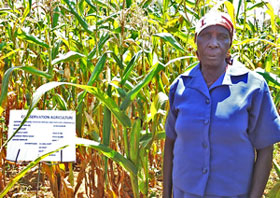The current crisis in the Horn of Africa highlights the importance of food security. One in three people go hungry every day in Africa-a continent that holds 60 per cent of the world's uncultivated arable land.
Achieving long term food security in Africa and other parts of the world will require effective and cooperative action not only between donors, but governments, civil society and the private sector. This was recently reinforced through The Perth Declaration on Food Security Principles (external website) emerging from the Commonwealth Heads of Government meeting and the accompanying joint statement on cooperation on food security and nutrition in Africa. [PDF 18kb]
Australia has a role to play to support the countries of Africa address this challenge.
Underinvestment in agricultural research, innovation and human capacity building are key factors affecting Africa's long term food security. Australia has unique agricultural and scientific expertise and world class teaching and research institutions that are well suited to African agriculture and food security. This expertise includes dry-land and tropical farming, climate change adaptation, commercialisation of agricultural research and agriculture water and soil management.
On 28 October 2011 Prime Minister Julia Gillard today announced the Australian Government will establish an Australian International Centre for Food Security (external website) to share our agricultural expertise with the people of Africa. The Centre will be led by the Australian Centre for International Agricultural Research (ACIAR).
The Centre will provide farmers, government agencies and the private sector access to the research and technical expertise of a large network of Australian, African and international research bodies – most notably the Consultative Group on International Agricultural Research.
As an important first step in this work, in 2012 the Centre will host an international conference entitled 'Food Security in Africa: Bridging Research and Practice'. The conference will bring together a range of Australian and African research partners, and international experts, to identify opportunities for cooperation.
Australia will also support the 'Research in Business' program of the Alliance for a Green Revolution in Africa. This funding, together with the work of the Centre, will help get research products into the hands of farmers to improve their productivity. This a key part of meeting the food security challenge.
This package of assistance builds on Australia's existing $100 million initiative that is working with African, Australian and International partners to improve agricultural research through productivity, improve rural livelihoods through better market access and increase community resilience through social protection programs.
Achieving results through cooperation and a principled approach
On Saturday 29 October 2011 the leaders of 54 Commonwealth countries agreed on a common approach for addressing the challenge of food insecurity.
Under The Perth Declaration on Food Security Principles (external website), Commonwealth countries have committed to a common approach to address food insecurity.
The Declaration focuses on development assistance and capacity building for food security through agricultural research, lifting productivity and through the better functioning of markets.
It advocates reducing barriers to trade in agriculture, improving agricultural productivity and facilitating greater market access for farmers in developing countries.
To complement and help give practical effect to the Perth Declaration, the governments of Australia, Canada, New Zealand and the United Kingdom released a joint statement on cooperation on food security and nutrition in Africa [PDF 18kb]. The four donor countries will work closely together in support of African-led initiatives to boost agricultural productivity, improve nutrition and alleviate the impacts of food crises.
More information
-
Food security: markets update–October 2011 [PDF 164kb]
Food security: markets update–October 2011 [Word 515kb]

